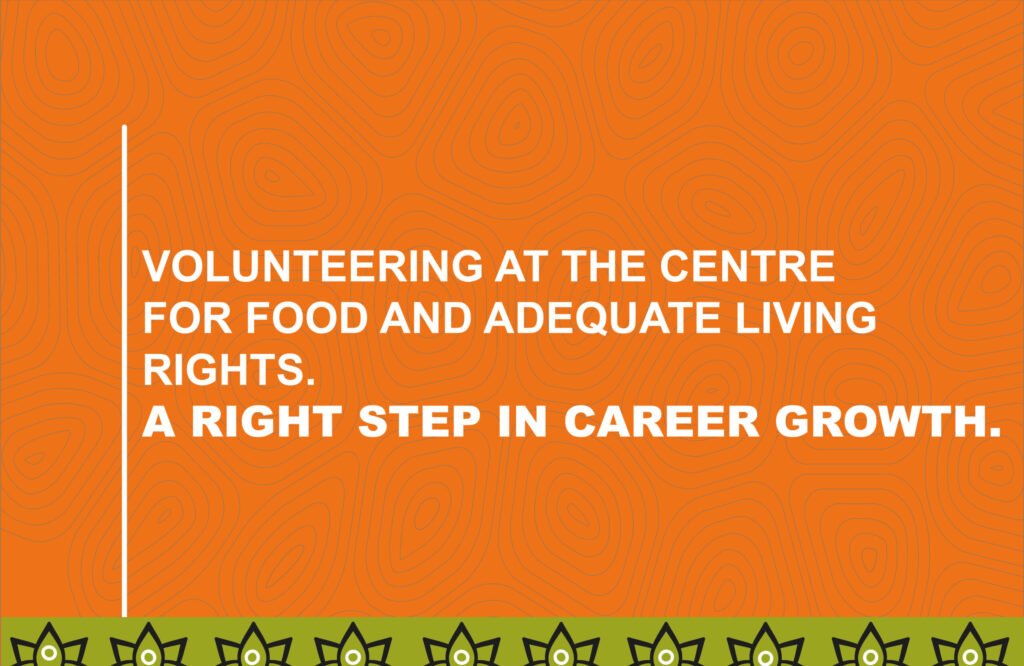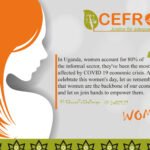Early this year, I joined Centre for Food and Adequate Living Rights (CEFROHT) located in Gayaza– a town in Wakiso District. CEFROHT’s work is directed towards the interconnection of Food Justice, Climate Justice and Economic Justice promoting adequate living rights. These include utilizing legal tools to ensure realization of land rights, food security and nutrition, livelihood rights, environmental health and rights.
Before joining CEFROHT, I sat for an interview which was more of interaction with the program and management team to learn what my strengthen and weaknesses were. This wasn’t an easy one but I am glad I got accepted. On my first work day, arriving in the early hours of the morning after a long journey, I was anything but tired and excited at the same time. I couldn’t help but take in the first sights of my new work place for the next journey of my career and personal growth. This was the best decision I have made.
My first week was spent understanding CEFROHT’s work and settling in with other staff members, meeting the inspirational staff and going through their programming and the organization’s projects that they run. I felt so welcomed by everyone at Centre for Food and Adequate Living Rights who are making such an effort to teach me about the projects and life in CEFROHT.
In my first month at the organization, I visited the Agroecology farm project in Kiboga. This is one of the sustainable agroecology project where I got to learn the practice of principles in agroecology including recycling -preferentially use local renewable resources and close as far as possible resource cycles of nutrients and biomass; input reduction to reduce or eliminate dependency on purchased inputs; soil health aiming to secure and enhance soil health and functioning for improved plant growth, particularly by managing organic matter and by enhancing soil biological activity; animal health and welfare; biodiversity practices to maintain and enhance diversity of species ,functional diversity and genetic resources and maintain biodiversity in the agroecosystem over time and space at field, farm and landscape scales.
On the whole, I have learnt that agroecology places a strong emphasis on human and social values, such as dignity, equity, inclusion and justice all contributing to the improved livelihoods. It puts the aspirations and needs of those who produce, distribute and consume food at the heart of food systems. Agroecology builds autonomy and adaptive capacities to manage agro-ecosystems, empower people and communities to overcome poverty, hunger and malnutrition, while promoting human rights, such as the right to food, and stewardship of the environment so that future generations can also live in prosperity.
I am now building a career in promoting agroecology. As a woman, during the volunteer period, CEFROHT has helped me to appreciate that agroecology seeks to address gender inequalities. This is because, it creates opportunities for women. I now understand that globally, women make up almost half of the agricultural workforce. They also play a vital role in household food security, dietary diversity and health, as well as in the conservation and sustainable use of biological diversity; yet, women remain economically marginalized and vulnerable to violations of their rights, while their contributions often remain unrecognized.
I look forward therefore to use agroecology to assist rural women in family farming agriculture to develop higher levels of autonomy and participation using a human rights-based approach by building knowledge, through collective action and creating opportunities for commercialization. CEFROHT is already negotiating with municipal councils and districts to establish more earth markets and link up women into the trade. I therefore will continue to use agroecology to open spaces for women to become more autonomous and through our community empowerment program, empower them at household, community levels and beyond- for instance, through participation in producer groups, because women’s participation is essential for agroecology and women are frequently the leaders of agroecology.
As a volunteer, I enjoyed it so much and indeed I learnt from attending the community advocacy training, meetings and workshops the outstanding one was when I attended the advocacy training hosted by PELUM at Grand Global in March. I also was involved in the access to justice project and I got a chance to go to the field and carried out different activities with other staff members who were supportive and made sure I learnt what to do and showed me how the work is done. For instance, holding a radio talk show, community baraaza, training farmers on Agroecology and their Adequate Living Rights in three different districts places in Kiboga, Kyankwanzi and Buyende district and all the three communities were welcoming which is an interesting and amazing experience.
The communities have too many gaps when it comes to access to the right to adequate living rights. The courts are too far, many women are both economically and socially excluded, they have no legal advice and the social structures keep them marginalized and incapable of asserting their rights. There is too much to learn from within and engaging the women to be solution. I have been introduced to the use of a human based rights-based approach to aid sustainable access to justice. The justice actors must use this tool to benefit all women and other vulnerable groups like youths and children. I feel a new me – a career that is incessantly overpouring to work for and with communities, to legally empowers and ensure social justice prevails. I shall forever be grateful to CEFROHT.
My volunteering time at CEFROHT has also introduced me to deeper understanding of Agriculture and how human rights-based approach can be used to enhance the livelihoods of the majority poor. Farming being the backbone of Uganda’s economy, is very key to the achievement of sustainable development goals (SDGs) and to the growth of our society. As stated by Thomas Jefferson who said that, “Agriculture is our wisest pursuit, because it will in the end contribute most to real wealth, good morals, and happiness.”
CEFROHT uses the PANTHER principles (Participation, Accountability, Non-Discrimination, Transparency, Human Dignity, Equity and Rule of law). The principles are the hinges holding the economic and social inclusion work in the organization. I now have a deeper understanding that unequal power relations, and exclusion is denying people realization of adequate living rights and keeps them in poverty.
Volunteering time at CEFROHT is a space for learning team work. I saw myself being involved in all activities in the organization. This gave me opportunities to learn from senior staff members. The staff members work very hard and continues to contribute to the growth of CEFROHT and community at large. This is why they never fail to promote Adequate Living Rights of women children, orphans, Persons living With Disabilities and youths as well as food justice, economic justice and climate justice.
CEFROHT is where I spend my time with other staff members especially from Monday to Friday and sometimes out on the field to carryout activities like training farmers on agroecology as our new project. Moments like this represents the real positive work CEFROHT do day in day out to help vulnerable communities to improve food, economic and climate justice.
Although there were some challenges that I encountered, I was able to cope up with the situation in the hard-to-reach communities that we visited. I would like to truly thank everyone at CEFROHT for allowing me to be part of this family, all of whom share the same vision of promoting the realization of the right to adequate living for everyone specifically the vulnerable communities.
Paul Chatfield once said, “Agriculture is the noblest of all alchemy; for it turns earth, and even manure, into gold, conferring upon its cultivator the additional reward of health.”
In a nutshell, I will work together with the entire team at CEFROHT to promote social justice in food, agriculture and investment systems through strategic litigation, research, advocacy and community empowerment. And I will forever be indebted.
Social Justice for Adequate Living Rights.
Written by: Catherine Awidi – Program Officer




